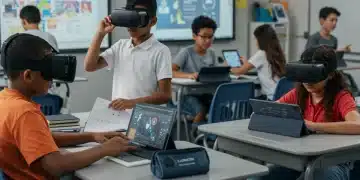AI literacy campaigns trends that educators should know

AI literacy campaigns are essential for preparing students to understand and effectively engage with technology, fostering critical thinking and ethical considerations.
AI literacy campaigns trends are becoming increasingly important in educational settings. Have you noticed how rapidly technology evolves? Understanding AI helps both educators and students navigate this landscape effectively.
The rise of AI literacy in education
Understanding the rise of AI literacy in education is essential for educators and students alike. As technology advances, the importance of being digitally savvy grows. This trend is pushing schools to embrace AI as part of their curriculum.
What is AI literacy?
AI literacy means having the skills to understand and use artificial intelligence tools. It’s not just about using technology but understanding how it works and its implications. Students who grasp these concepts are better equipped for their futures.
Benefits of AI literacy
- Enhances critical thinking skills
- Prepares students for future job markets
- Encourages innovation and creativity
As we think about the benefits, we also need to recognize the challenges. Some educators might not feel comfortable teaching these new concepts. However, training and resources are becoming more accessible to help bridge this gap.
Incorporating AI literacy into classrooms creates opportunities for hands-on learning. For instance, students can engage in projects that involve real-world applications of AI. This not only keeps learning relevant but also sparks interest among students.
Real-world applications
Examples of AI applications in education include:
- Intelligent tutoring systems that adapt to each student’s pace
- AI tools that assist teachers in grading and providing feedback
- Chatbots that can help answer student queries
Such tools show how AI literacy can create personalized learning experiences. As students learn to use and understand these technologies, they also develop a sense of responsibility regarding ethical considerations in AI.
In conclusion, as the rise of AI literacy continues, the collaboration between educators and technology will only deepen. By understanding AI, students become capable of navigating an increasingly digital world and making informed decisions.
Key strategies for effective AI literacy campaigns

To ensure successful AI literacy campaigns, a strategic approach is vital. Understanding how to effectively implement these campaigns can greatly enhance the learning experience for students.
Engaging Stakeholders
Involving teachers, parents, and community members is essential for the success of AI literacy initiatives. When all stakeholders are engaged, it creates a supportive environment where students can thrive. Workshops and community meetings can help raise awareness and involvement.
Curriculum Integration
Integrating AI literacy into existing subjects makes learning more relevant. Here are some ways to achieve this:
- Use AI tools for math or science projects
- Encourage critical thinking about AI in history classes
- Implement coding lessons that highlight AI concepts
Integration helps students see the practical applications of what they learn. This relevance encourages interest and adoption of AI literacy.
Another important aspect is providing adequate training for educators. When teachers are well-trained, they feel confident teaching these new concepts. Professional development programs focusing on AI can empower educators with the necessary skills and resources.
Utilizing Technology
Choosing the right technology tools is crucial in an AI literacy campaign. Various platforms can enhance learning, such as:
- Interactive software that encourages collaboration
- AI-powered learning management systems
- Applications that simulate real-world AI scenarios
These technologies not only support the learning process but also keep students engaged with interactive content.
Furthermore, creating a feedback loop where students can express what they learn is beneficial for refining the approach. Regular surveys and assessments allow for adjustments to the campaign, ensuring it meets the needs of all learners.
Impact of AI literacy on student engagement
The impact of AI literacy on student engagement is significant and can alter the way students interact with their learning environment. When students understand AI concepts, their curiosity about technology increases.
Increased Participation
Students who are educated about AI tend to participate more in class discussions. They feel empowered to ask questions and share their thoughts on how AI affects their lives. This kind of participation fosters a dynamic learning atmosphere.
Real-World Applications
Connecting AI literacy to real-life scenarios captivates students’ interests. For instance, showcasing how AI is used in video games or social media can help students see its relevance:
- Understanding how recommendation systems work
- Exploring AI in virtual assistants like Siri and Alexa
- Examining AI in healthcare for diagnosis and treatment
When students see these applications, they become more engaged in their studies, as it relates to their everyday experiences.
Additionally, hands-on activities can greatly increase student engagement. Projects that involve coding, data analysis, or the use of AI tools allow students to experiment and learn by doing. This interactive learning approach often leads to deeper understanding and retention of knowledge.
Boosting Collaboration
AI literacy also encourages collaboration among students. Group projects centered around AI allow them to work together, enhance their teamwork skills, and learn from each other. They can brainstorm ideas, share insights, and develop solutions collectively. Such experiences make learning enjoyable and stimulate peer engagement.
Moreover, students who grasp AI literacy are more inclined to think critically about technology, leading them to question and analyze the ethical implications of AI usage. This critical thinking fosters a sense of responsibility, further boosting their engagement.
Future trends in AI literacy campaigns

Future trends in AI literacy campaigns are evolving rapidly as technology advances and education adapts. It’s important to anticipate how these changes will shape learning.
Personalized Learning Experiences
One major trend is the shift towards personalized learning. AI can help tailor educational experiences to meet individual student needs. This means adapting lessons based on a student’s pace, strengths, and weaknesses.
Integration of Virtual and Augmented Reality
Another exciting development is the use of virtual and augmented reality (VR and AR) in teaching AI concepts. These technologies can create immersive learning environments
- Interactive simulations that allow students to explore AI applications in real-time
- VR experiences that demonstrate AI’s impact on various industries
- AR tools that enhance classroom activities by overlaying digital information on physical spaces
Such tools can greatly enhance student engagement and retention of knowledge.
Moreover, there will be a greater emphasis on ethical considerations in AI literacy. As students learn about AI, understanding its ethical implications is crucial. Future campaigns will likely incorporate discussions around bias in AI, data privacy, and the societal impact of technology.
Collaboration and Global Learning
We can also anticipate an increase in collaboration between educational institutions worldwide. Students will have the chance to engage in projects that connect them with peers from different cultures. This global perspective will help them appreciate the diverse ways AI is applied globally.
Additionally, leveraging AI itself for assessing student learning and engagement can become a standard practice. AI-driven analytics will provide teachers with insights into student progress, allowing for timely interventions and support.
The future of AI literacy campaigns promises innovative strategies that enhance learning, engage students, and prepare them for a technology-driven world.
FAQ – Frequently Asked Questions about AI Literacy Campaigns
What is AI literacy?
AI literacy refers to the knowledge and skills needed to understand, use, and think critically about artificial intelligence technologies.
Why is AI literacy important for students?
AI literacy is crucial for students as it prepares them for future careers, encourages critical thinking, and helps them understand the ethical implications of technology.
How can schools effectively implement AI literacy campaigns?
Schools can implement effective AI literacy campaigns by engaging stakeholders, integrating AI into the curriculum, providing adequate training for teachers, and utilizing modern technology for interactive learning.
What future trends can we expect in AI literacy campaigns?
Future trends in AI literacy campaigns include personalized learning experiences, the integration of virtual and augmented reality, and a greater emphasis on ethical considerations in technology.





